- Home - News
- TWI News | TV
- Polls
- Year In Review
- News Archive
- Crime & Punishment
- Politics
- Regional
- Editorial
- Health
- Ghanaians Abroad
- Tabloid
- Africa
- Religion
- Election 2020
- Coronavirus
- News Videos | TV
- Photo Archives
- News Headlines
- Press Release
General News of Sunday, 21 May 2006
Source: GNA
Hundreds participate in "Fight Hunger" walk
Accra, May 21, GNA - Hundreds of Ghanaian workers, joined by expatriates and school kids on Sunday participated in a global walk against hunger through some principal streets of the capital, Accra. The United Nations-sponsored walk, dubbed "Fight hunger - Walk the world 2006," was the third in the series with a common aim of raising awareness about global hunger, especially among children, and mobilising funds worldwide to end it.
By commemorating the event, Ghana has joined thousands of marchers in 110 countries worldwide in consecutive time zones to reaffirm support for the UN's millennium declaration to halve the 850 million hungry people globally by 2015.
Mr Osei Bonsu Amoah, Deputy Minister for Education, Science and Sports, cut the tape for the start of the march from the Golden Tulip hotel, along the street in front of the 37 Military hospital through the Ako Adjei interchange, the Independence Avenue, Liberation Circle, in front of the State House and ending at the seafront Independence Square.
Ms Trudy Bower-Pirinis, World Food Programme representative, said as a result of the momentum generated, proceeds from this year's walk could double to 20,000 dollars, from 10,000 dollars raised in 2005. She said the proceeds would directly be used to improve food deficit in rural communities, community-based nutrition and school feeding programmes. She held that despite Ghana's impressive gains in governance, economic growth and macroeconomic stability, household food security, early childhood nutrition, as well as gender parity in education remained challenges.
Ms Bower-Pirinis said in the next four years, her outfit would undertake four innovative programmes aimed at bolstering the incomes of local farmers in Ghana. These include phasing out external food aid by 2010 and the purchasing 60 percent of the commodities to be used in community-based feeding programmes.
The rest are the procurement and distribution of locally produced fortified commodities such as corn soya blend, iodized salt and palm oil, which are essential for growth, brain development and protection against diseases.
She said the WFP was developing Ghana as a regional supplier of commodities to its emergency programmes within West Africa and that it had received its first regional tender to buy iodized salt for its programmes in Burkina Faso.










